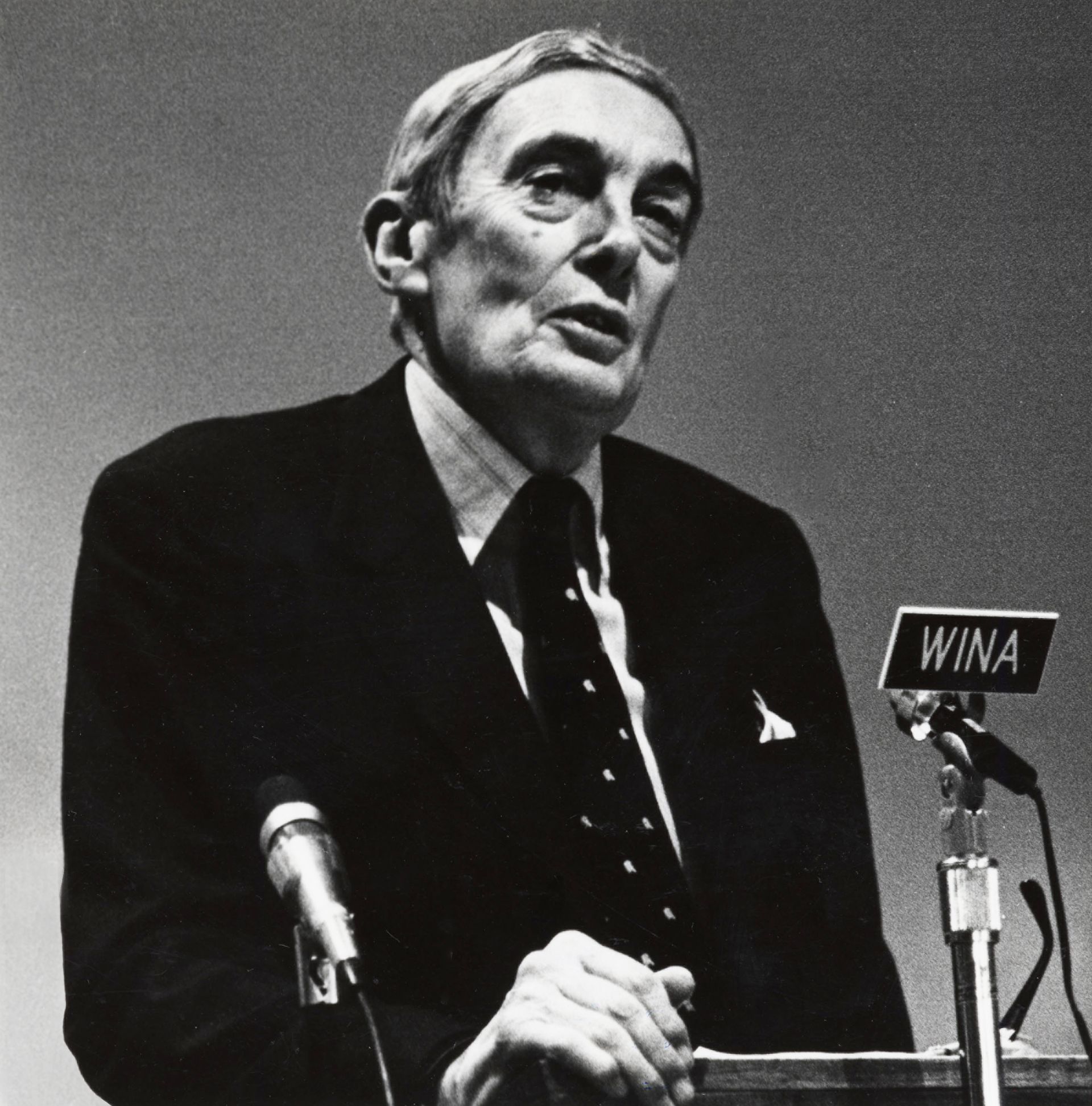1977
Our President in 1977/8 was:
The Right Hon. the Lord Scarman
He proposed the Toast to Sir Walter at our 70th Annual Dinner on Friday 5th March 1978 in The North British Hotel
Download the [transcript] or read the [bulletin]
Summary of the Speech:
Leslie George Scarman, Baron Scarman, delivered a rich, insightful, and often humorous tribute to Sir Walter Scott, focusing on Scott’s genius, characterisation, and moral imagination. His speech offers both personal reflection and literary analysis, centring on Scott’s achievements in law, poetry, and especially the novel. Here are the key themes and highlights:
Core Themes:
1. The Romantic Imagination and Tragic Insight:
Lord Scarman began with Scott’s final journey, quoting from Sir William Gell’s memoranda, and illustrating Scott’s immediate, romantic vision of a medieval tower in Italy. Scarman likened Scott’s tragic depth to that of Euripides and Shakespeare, noting that his power lies in understanding human endurance in the face of profound conflict—be it religious, political, or personal.
2. Scott vs. the Theatre:
Despite his storytelling prowess, Scott avoided the stage. Scarman quoted Scott's own dismissive remark about theatre: “What—and have producers and actors muddle it all up?” Scott’s talents lay in prose and poetry, not dramatic performance.
3. Comparison with Mozart:
Scarman made a fascinating comparison between Scott and Mozart—two geniuses who sometimes exhibited careless haste, yet whose work was profoundly shaped by an awareness of life’s brevity and the urge to create.
4. Enduring Legacy of the Novels:
While acknowledging Scott’s poetic mastery, Scarman argued that Scott’s lasting claim to immortality rests on his novels, starting with
Waverley (1814). He praised Scott’s ability to merge romanticism with realism and to craft vivid, morally complex characters across social classes.
Literary Analysis:
5. Justice as a Central Theme:
Scarman lauded Scott’s passion for justice, particularly in
Guy Mannering and
The Heart of Midlothian. He highlighted Meg Merrilees and Jeanie Deans as two of Scott’s greatest moral creations—ordinary women whose actions define deep ethical integrity and resistance to legal injustice.
6. Lawyers in Scott's Fiction:
Lord Scarman, a lawyer himself, celebrated Scott’s portrayal of legal figures like Paulus Pleydell (Guy Mannering) and Mr Saddletree (The Heart of Midlothian). He admired Scott’s wit in creating foolish or pompous legal types alongside truly noble advocates.
Notable quote from Pleydell:
“Justice, like charity, should begin at home.”
7. Scott’s Legal Knowledge and Reformist Role:
Scarman reviewed Scott’s real-life legal career, including his long service as Sheriff of Selkirkshire and Clerk of Session. He noted Scott’s work on early law reform and lauded his role in Scottish legal history.
Historical and Political Views:
8. Scott as Unionist and European:
Lord Scarman affirmed Scott’s support for the Acts of Union (1707) and the Revolution Settlement (1688), arguing that Scott balanced Scottish patriotism with broader British and European sympathies.
9. Politics as Background, Not Driver:
Although politically engaged, Scott’s imagination was never dominated by ideology. Scarman saw Scott primarily as a chronicler of human courage, justice, and reconciliation.
Humour and Humanity:
10. Warmth, Irony, and Self-Awareness:
Scarman used fictional dialogue with David Hume to showcase Scott’s witty, self-deprecating take on being labelled a Jacobite, cavalryman, and Scottish lawyer. He concluded that Scott “was always laughing at, and with, lawyers.”
Final Sentiments:
Scarman ended by invoking Bailie Jarvie from Rob Roy, who championed the Union in practical terms, and declared:
“The Hieland blude o’ me warms at these daft tales.”
This, Scarman noted, echoed his own sentiment—despite being “a London-born Cockney.”
Interesting Points Worth Noting:
- The comparison of Scott with Mozart is both unusual and thought-provoking.
- Lord Scarman reads Scott as a proto-European figure, deeply engaged with Enlightenment ideals of unity, justice, and reason.
- The speech insightfully highlights how Scott’s characters often embody legal and moral dilemmas—especially through women of principle.
- It’s one of the most legally literate tributes in the Club’s archive, reflecting Scarman’s judicial background.
Download the [transcript] or read the [bulletin]

Subsidiary Toasts
After the toast to The Queen had been honoured, the Chairman proposed “The City of Edinburgh”, to which Councillor Drummond Young, the Deputy Chairman of the City of Edinburgh District Council, replied.
The toast of “Her Majesty’s Forces” was proposed by Mr Kenneth Ryden, M.C., the Master of the Company of Merchants of the City of Edinburgh, and the reply was made by Vice-Admiral Cameron Rusby, M.V.O., the Flag Officer, Scotland and Northern Ireland.
The toast of “The Chairman” was proposed by Mr Michael S. R. Bruce, Q.C.


